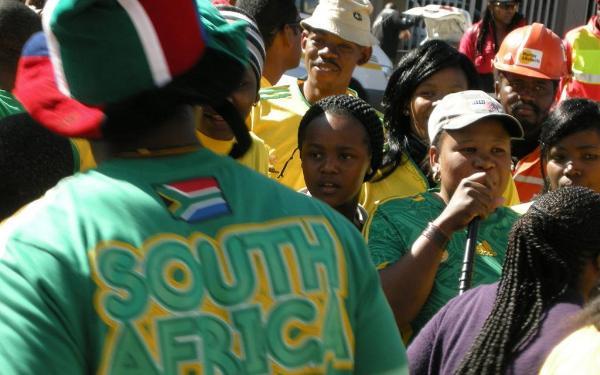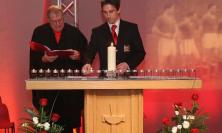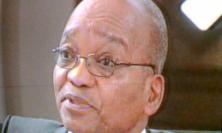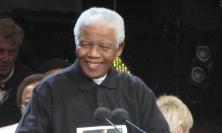For the last four weeks, the world’s attention has been focused on South Africa as it played host to the 2010 FIFA World Cup, but that month in the spotlight was preceded by years of preparation and will now have a lasting impact on the lives of the people of South Africa. Rampe Hlobo SJ suggests that South Africans have been the real winners of the World Cup – how has the tournament been a turning point for the country, and in fact the whole of Africa?
It is now just over six years since that Saturday morning of 15 May 2004 when Sepp Blatter, President of FIFA, sent most South Africans into a state of wild euphoria when he announced the host nation for the 2010 FIFA World Cup. The FIFA executive had decided to give Africa an opportunity to welcome and host football fans from all over the world. The incredulous, the contemptuous and the malicious quickly criticised the decision made by FIFA, doubting South Africa’s ability to host one of the most prestigious sporting tournaments in the world. Many South Africans still remember the cynicism being such that Australia even volunteered to host the tournament should South Africa fail. South Africa, as we have seen, embraced the huge responsibility of being the first African organiser of the World Cup.
Since that Saturday, thank goodness, South Africans rolled up their sleeves with many others who trusted their capability and were not as ignorant as the sceptics. From that time until the beginning of this wonderful football tournament, South Africans have been hard at work building, renovating and putting final touches to our old and new infrastructure. Preparations included building new stadia and revamping the Soccer City stadium, giving it a serious uplift and upgrade. In some townships, like Soweto in Johannesburg, some converted their houses into B&Bs and went into partnership with big hotels to cater for visitors who preferred township accommodation to a five-star hotel in upmarket Johannesburg. The preparations for this one-month spectacle kept South Africans busy and, most importantly, created employment for hundreds of thousands who were unemployed. Many thousands of others have been enthusiastically preparing to offer true African hospitality to our guests. When all the preparations were done and our guests started arriving, what met them when they touched down at the O.R .Tambo International Airport in Johannesburg, were not lions or leopards, but the fruits of six years of hard work which will distinguish this World Cup tournament from all its predecessors.
Since this was to be the first ever FIFA World Cup on the African continent, ideas were bounced around and talks held with a view to as many African countries as possible benefitting from this quadrennial sporting event. Unfortunately, the reality fell short of these dreams. Mozambique, Zimbabwe and Tanzania, to name a few, were lucky enough to see some of the world-class footballers play in their stadia, but the failure to get more teams playing their practice games in other African countries was a disappointment. This was also a failure to make this tournament as truly African as was initially envisaged. For many who cannot and will never be able to afford a trip to a World Cup tournament, it must have been a huge disappointment. Their hopes of seeing their favourite football stars will for now have to remain hopes and dreams, just as they have always been.
The World Cup tournament also raised a number of serious social justice concerns. Some, mostly the poor, seem to have been denied the opportunity of making some extra money during this past month. Needless to say, it was not only the hopes of those who had wished to see their stars that were crushed, but also those of informal traders and vendors. The latter have, for many years, been part of the football matches around this country. These mostly unemployed traders, who support their families and survive entirely by selling food and drinks at football matches, came to know the draconian side of this wonderful tournament, and of FIFA - the ruthless and unscrupulous money-making body which would not allow the poor to make any money during the tournament. Many who are poor, needy and could do with a tiny share of the billions of Rands generated by this tournament were left out in the cold in their poverty.
Some social justice issues were also labour-related. The period of the World Cup was marked by security guards threatening to walk out – and in some cases actually walking out – of their jobs. The greed of some of the bosses of security companies contracted by FIFA during the World Cup resulted in their security guards being paid less than half of what they were promised while the bosses were smiling all the way to the bank. The situation posed a serious security risk, but fortunately the crowds were well behaved and security never became an issue. Some of the South African labour federations, needless to say, saw this past month as the opportune moment to fight for better remuneration. Although in some cases there were serious threats of industrial action, people wanted to see football, and football they saw!
Those in the arts and crafts trade were luckier. They seem to have won big from the World Cup through tourism. The influx of both international and South African football fans in Soweto and Guguletu in the Cape has helped their sales – with some seeing five times their usual turnover. The restaurants and shebeens (a home turned into a pub) in the townships also made huge profits from tourists. Business was indeed unusual during this past month or so, and the presence of international tourists seems to have had a positive impact on the lives of the local people.
As one would imagine and hope, the exchange went beyond economics. The cultural diversity presented by the visitors was a chance for many South Africans to broaden their horizons and learn about the countries participating in the tournament. Many who have not had the opportunity to go abroad had the pleasure of interacting with people from different parts of the world and even learning new customs and greetings in different languages. The cultural exchanges included, not least, teaching our visitors how to blow the vuvuzela – one cannot talk about the 2010 FIFA World Cup and not mention the vuvuzela, South Africa’s contribution to world football culture!
There was also a religious dimension. Many of the fans and visitors went further than the stadia, shebeens and museums, and came to pray with the local people in the townships and cities that hosted them. The South African Catholic Bishops’ Conference had also prepared a website called ‘Church-on-the-Ball’ and an accompanying prayer book, which contained not only simple prayers and reflections for both visitors and locals but also the addresses of parishes near the World Cup stadia. In a concrete way, the Church in South Africa celebrated 13 June as ‘Soccer Sunday’. It was an exampleof football and faith coming together and making the whole experience a truly spiritual one. As Archbishop Tlhagale, the president of the Bishops’ Conference put it, ‘Football is not specifically religious, but when the whole world joins in, it is a great occasion to celebrate one’s faith too with brothers and sisters from around the globe! So it can become a spiritual experience.’
As the FIFA World Cup comes to an end, as our visitors return home and as one reflects on the whole experience, one hopes that South Africa will not be the same again. This big moment for football, some have argued, was a turning-point not only for South Africa but for the whole continent. The experience of preparing for and hosting this prestigious tournament has taken the South African nation to another level that we had not reached as a country: the efficient infrastructural delivery, including meeting deadlines, the provision of public transport system, providing effective policing and a justice system, revamping and giving our cities a beautiful facelift – all of this was done in a relatively short space of time proving that where there is a will, there is a way. As a result many South Africans are beginning to put pressure on our government, demanding that it start delivering on its promises to the poor of this country who voted for it. The government, at all levels, should roll its sleeves up further and start serving the people with the same seriousness and commitment that characterised the World Cup preparations. The pressure is on for it to offer better services to its people. If it can do it for the World Cup, it can do it for its citizens – that is the refrain we are hearing now.
With the successful hosting of the World Cup, many are convinced that this country is capable of, inter alia, protecting all those who live in it from the criminals who have been terrorising innocent people. There has been serious, visible policing in the streets of many cities, and as a result crime has been reduced drastically. The bobby, the people demand, should remain on the beat and the ordinary person should go on with his or her life without fear of being a victim of crime. Service-delivery and the building of more infrastructure – especially the expansion of a well-organised public transport system – are just a couple of the many expectations that South Africans have. There are many other legitimate demands now voiced more strongly by many South Africans, partly as a result of this historic tournament.
The legacy of this World Cup will resonate, it seems, to the furthest corner of this country. South Africans who experienced the festivities, the football and the euphoria of this tournament will forever be talking about this as one of the best months, if not the best month, of their lives. It was a month that left us as South Africans with a sense of pride together with the rest of the African continent. We have represented the continent very well on the world stage, just as the Ghanaian team did on the football pitch. It has and will always be the time that we really offered the world first class African hospitality and left everyone pleasantly surprised.
The greatest challenge that remains with us as South Africans, however, is not to allow this experience of hosting what is arguably the best ever World Cup tournament to be spoilt by the rumours of possible xenophobic attacks. What we have just experienced in this month could be compared to the experience of the apostles Peter, James and John when they witnessed the Transfiguration of the Lord (Mark 9: 2-9): it was good and should remain good. Many of us would have liked this joyous experience to last, but, like the apostles, the time has come for us to come down from the mountain of the Transfiguration. While we carry on with our ordinary lives, we should allow this experience to be a source of even greater unity. The legacy of this 2010 World Cup for the African continent should be the harambee[1] that we have been hearing about throughout this tournament and certainly experienced when Ghana played Uruguay. Ke nako[2] (it is time) for us to emerge together, strong and united as a people, just as we were when the continent supported the Black Stars who carried our hopes and dreams.
Rampe Hlobo SJ works for the Southern African region of the Jesuit Refugee Service.
[1] Harambee is a call in Kiswahili to come together.
[2] Ke nako is a Sesotho phrase meaning ‘The time has come!’






